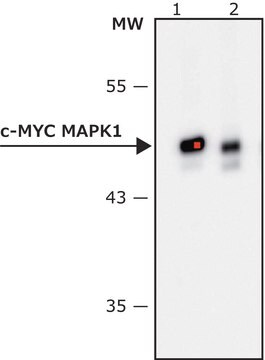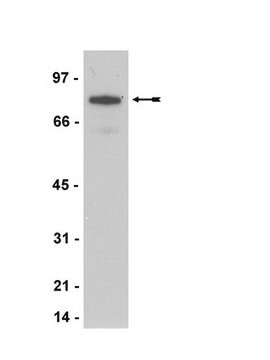16-213
Anti-Myc Tag Antibody, clone 4A6, HRP conjugate
clone 4A6, Upstate®, from mouse
Synonyme(s) :
Transcription factor p64, avian myelocytomatosis viral oncogene homolog, myc proto-oncogene protein, v-myc avian myelocytomatosis viral oncogene homolog, v-myc myelocytomatosis viral oncogene homolog (avian)
About This Item
Produits recommandés
Source biologique
mouse
Niveau de qualité
Conjugué
peroxidase conjugate
Forme d'anticorps
purified immunoglobulin
Type de produit anticorps
primary antibodies
Clone
4A6, monoclonal
Espèces réactives
human
Fabricant/nom de marque
Upstate®
Technique(s)
western blot: suitable
Numéro d'accès NCBI
Numéro d'accès UniProt
Conditions d'expédition
dry ice
Modification post-traductionnelle de la cible
unmodified
Informations sur le gène
human ... MYC(4609)
Description générale
Specificity: Recognizes and is specific for recombinant proteins containing the Myc epitope tag (EQKLISEEDL) in a variety of sequence contexts. Also recognizes human Myc.
Species Cross-reactivity: Human, others not tested
Ig Type: IgG
Host: Mouse
Molecular Weight: Varies depending upon the protein which is tagged
Spécificité
Immunogène
Application
Epitope Tags & General Use
Epitope Tags
Qualité
Western Blot Analysis:
1:500 dilution of this antibody detected myc-PP2A on 10 µg of Myc-PP2A A subunit transfected NIH/3T3 lysates.
Description de la cible
Forme physique
Stockage et stabilité
Remarque sur l'analyse
Positive control for human Myc: Widespread expression including A431 cell lysate, ovarian cancer cell lysate, or breast carcinoma tissue. Myc fusion protein expressed in cells.
Autres remarques
Informations légales
Clause de non-responsabilité
Vous ne trouvez pas le bon produit ?
Essayez notre Outil de sélection de produits.
Mention d'avertissement
Warning
Mentions de danger
Conseils de prudence
Classification des risques
Aquatic Chronic 2 - Skin Sens. 1
Code de la classe de stockage
10 - Combustible liquids
Classe de danger pour l'eau (WGK)
WGK 3
Point d'éclair (°F)
390.2 °F - closed cup - Information refers to the main ingredient.
Point d'éclair (°C)
199 °C - closed cup - Information refers to the main ingredient.
Certificats d'analyse (COA)
Recherchez un Certificats d'analyse (COA) en saisissant le numéro de lot du produit. Les numéros de lot figurent sur l'étiquette du produit après les mots "Lot" ou "Batch".
Déjà en possession de ce produit ?
Retrouvez la documentation relative aux produits que vous avez récemment achetés dans la Bibliothèque de documents.
Les clients ont également consulté
Notre équipe de scientifiques dispose d'une expérience dans tous les secteurs de la recherche, notamment en sciences de la vie, science des matériaux, synthèse chimique, chromatographie, analyse et dans de nombreux autres domaines..
Contacter notre Service technique














